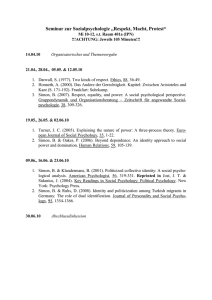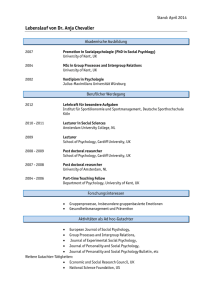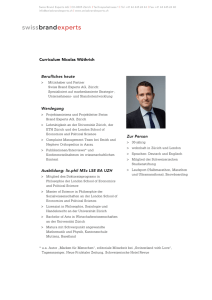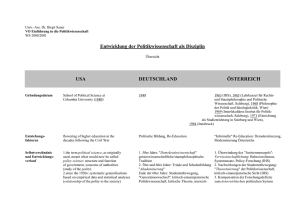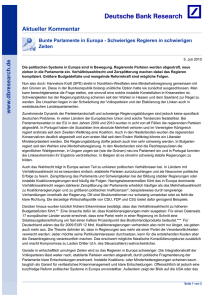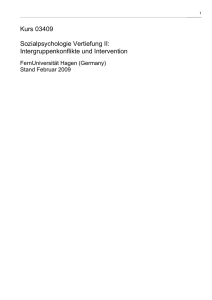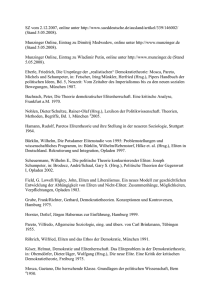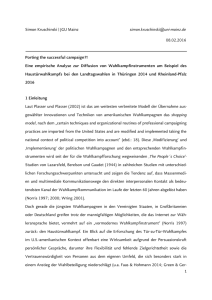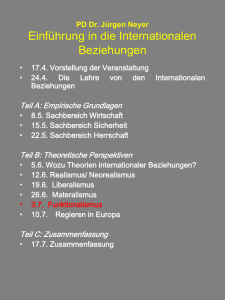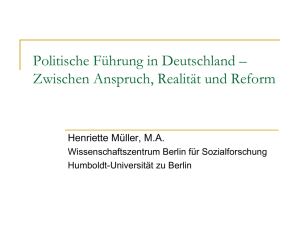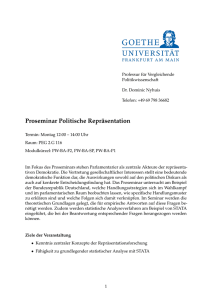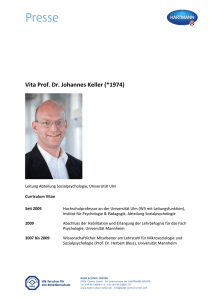Prüfung MI Politische Psychologie und Kommunikation
Werbung
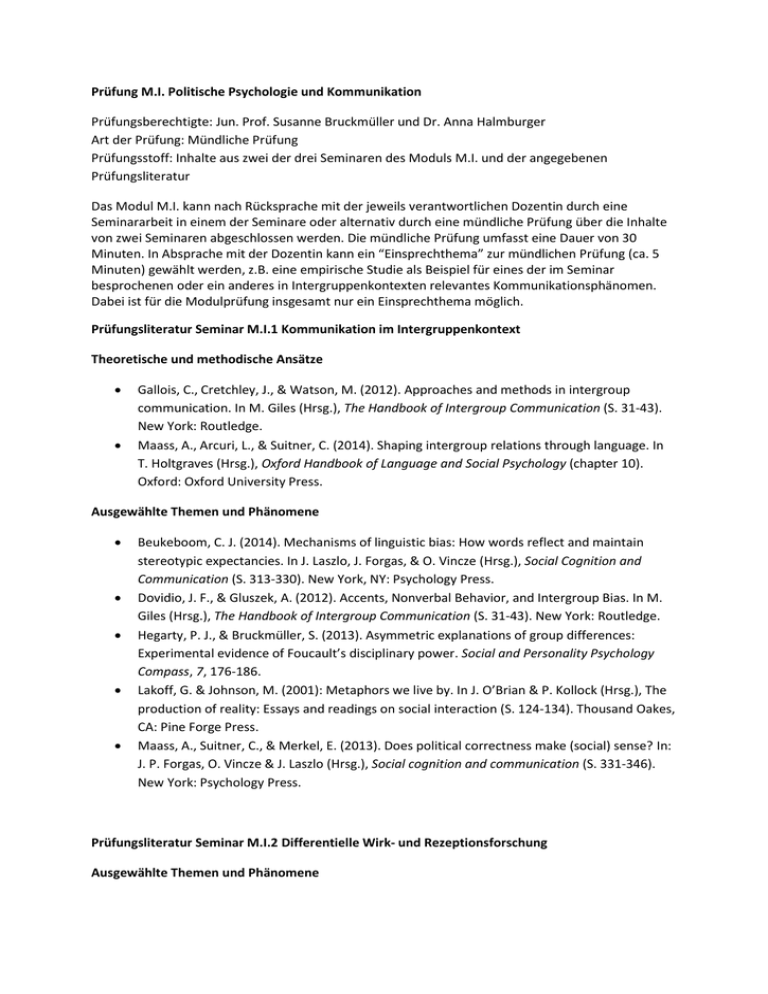
Prüfung M.I. Politische Psychologie und Kommunikation Prüfungsberechtigte: Jun. Prof. Susanne Bruckmüller und Dr. Anna Halmburger Art der Prüfung: Mündliche Prüfung Prüfungsstoff: Inhalte aus zwei der drei Seminaren des Moduls M.I. und der angegebenen Prüfungsliteratur Das Modul M.I. kann nach Rücksprache mit der jeweils verantwortlichen Dozentin durch eine Seminararbeit in einem der Seminare oder alternativ durch eine mündliche Prüfung über die Inhalte von zwei Seminaren abgeschlossen werden. Die mündliche Prüfung umfasst eine Dauer von 30 Minuten. In Absprache mit der Dozentin kann ein “Einsprechthema” zur mündlichen Prüfung (ca. 5 Minuten) gewählt werden, z.B. eine empirische Studie als Beispiel für eines der im Seminar besprochenen oder ein anderes in Intergruppenkontexten relevantes Kommunikationsphänomen. Dabei ist für die Modulprüfung insgesamt nur ein Einsprechthema möglich. Prüfungsliteratur Seminar M.I.1 Kommunikation im Intergruppenkontext Theoretische und methodische Ansätze Gallois, C., Cretchley, J., & Watson, M. (2012). Approaches and methods in intergroup communication. In M. Giles (Hrsg.), The Handbook of Intergroup Communication (S. 31-43). New York: Routledge. Maass, A., Arcuri, L., & Suitner, C. (2014). Shaping intergroup relations through language. In T. Holtgraves (Hrsg.), Oxford Handbook of Language and Social Psychology (chapter 10). Oxford: Oxford University Press. Ausgewählte Themen und Phänomene Beukeboom, C. J. (2014). Mechanisms of linguistic bias: How words reflect and maintain stereotypic expectancies. In J. Laszlo, J. Forgas, & O. Vincze (Hrsg.), Social Cognition and Communication (S. 313-330). New York, NY: Psychology Press. Dovidio, J. F., & Gluszek, A. (2012). Accents, Nonverbal Behavior, and Intergroup Bias. In M. Giles (Hrsg.), The Handbook of Intergroup Communication (S. 31-43). New York: Routledge. Hegarty, P. J., & Bruckmüller, S. (2013). Asymmetric explanations of group differences: Experimental evidence of Foucault’s disciplinary power. Social and Personality Psychology Compass, 7, 176-186. Lakoff, G. & Johnson, M. (2001): Metaphors we live by. In J. O’Brian & P. Kollock (Hrsg.), The production of reality: Essays and readings on social interaction (S. 124-134). Thousand Oakes, CA: Pine Forge Press. Maass, A., Suitner, C., & Merkel, E. (2013). Does political correctness make (social) sense? In: J. P. Forgas, O. Vincze & J. Laszlo (Hrsg.), Social cognition and communication (S. 331-346). New York: Psychology Press. Prüfungsliteratur Seminar M.I.2 Differentielle Wirk- und Rezeptionsforschung Ausgewählte Themen und Phänomene Halmburger, A., Rothmund, T., Schulte, M., & Baumert, A. (2012). Psychological reactions to political scandals: Effects on emotions, trust, and need for punishment. Journal of Political Psychology, 2(2), 30-51. Jost, J., Federico, C. M., & Napier, J. L. (2009). Political Ideology: Its Structure, Functions, and Elective Affinities. Annual Review of Psychology, 60, 307-337. doi:10.1146/annurev.psych.60.110707.163600 Kroh, M., & Selb, P. (2009). Inheritance and the Dynamics of Party Identification. Political Behavior, 31, 559-574. Kim, B. J. (2015). Political efficacy, community collective efficacy, trust and extroversion in the information society: Differences between online and offline civic/political activities. Government Information Quarterly, 32, 43-51. doi:10.1016/j.giq.2014.09.006 Ridout, T. N., & Searles, K. (2011). It's my campaign I'll cry if I want to: How and when campaigns use emotional appeals. Political Psychology, 32(3), 439-458. Todorov, A., Mandisodza, A. N., Goren, A., & Hall, C. C. (2005). Science, 308, 1623-1626. doi: 10.1126/science.1110589 Kruglanski, A. W., Gelfand, M. J., Bélanger, J. J., Sheveland, A., Hetiarachchi, M., & Gunaratna, R. (2014). The Psychology of Radicalization and Deradicalization: How Significance Quest Impacts Violent Extremism. Advances in Political Psychology, 35, 69-93. doi:10.1111/pops.12163
